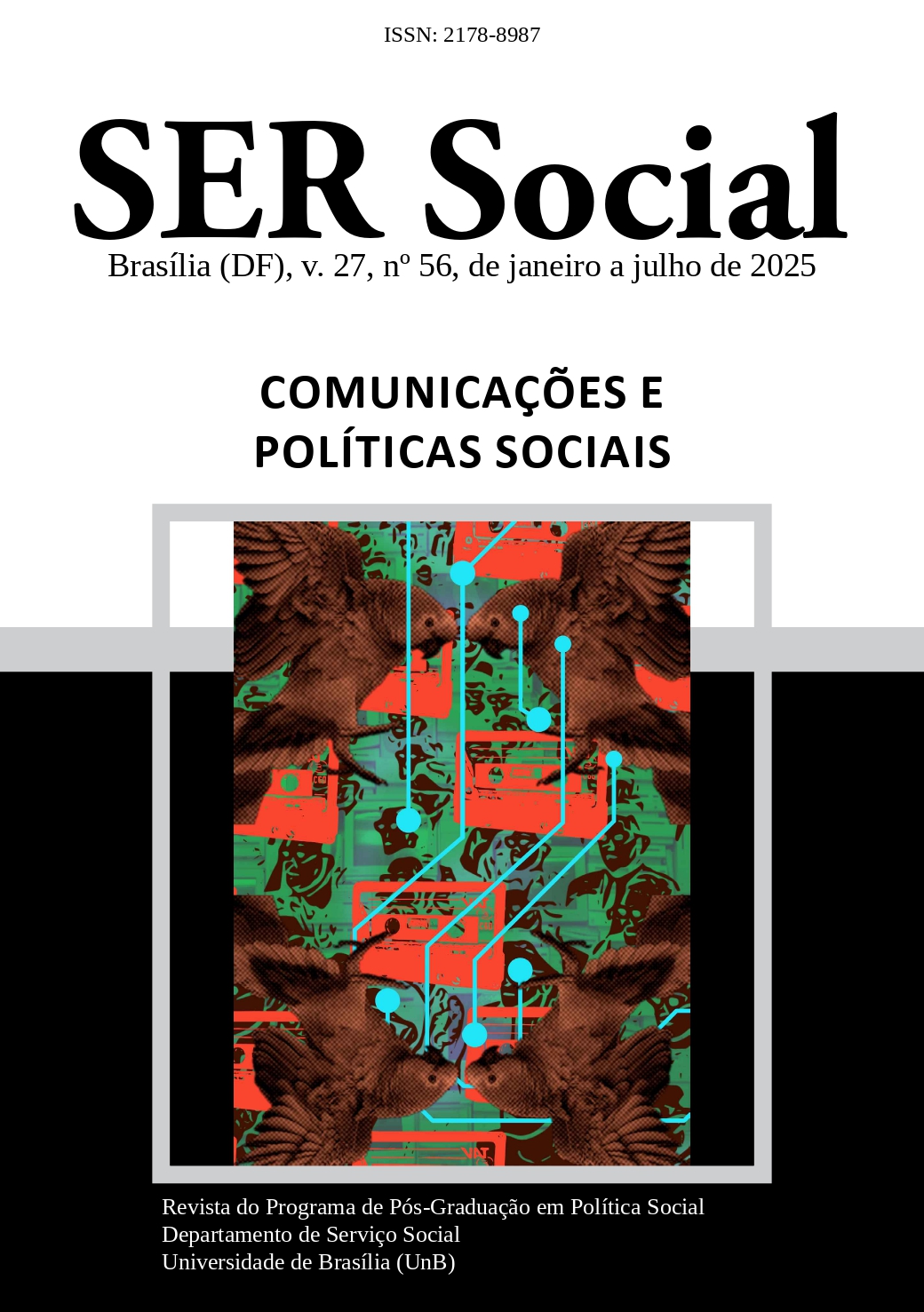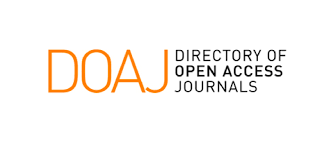Hegemony in the post-truth era: right-wing extremism and the illusion of disintermediation
DOI:
https://doi.org/10.26512/ser_social.v27i56.55611Keywords:
Hegemony, Post-truth, Far right, Illusion of disintermediationAbstract
This paper aims to analyze the conditions under which hegemony is exercised in the new cognitive atmosphere which has been conventionally called post-truth. We revisit the works of Antonio Gramsci and Raymond Williams, defining hegemony as a system of meanings experienced in everyday life, which shapes a “sense of reality” for people. Moving on, we present the post-truth landscape, highlighting a defining feature: the crisis of modern epistemic mediations and their replacement by algorithmic market mediations, guided by neoliberal principles. Finally, we show how the far right lives, in a militant way, the post-truth world, focusing on a foundation of today reactionary discourse that we define as illusion of disintermediation, a fetishized way of conceiving digital interactions as capable of providing an experience of “freedom” and “autonomy” based on supposed “direct access” to reality. The article intends to demonstrate how, based on specific economic and sociotechnical infrastructures, the coordinates of social order become dispositions of the mind, resulting in more subtle and penetrating ways of exercising hegemony.
Downloads
References
ART of the Lie: Post-Truth politics. The Economist [online]. 10 set. 2016. Disponível em: <https://www.economist.com/leaders/2016/09/10/art-of-the-lie>. Acesso em: 23 set. 2024.
BASTOS, M. A crise imanente da comunicação como forma social e os limites da concepção de “esfera semipública”: Notas dialéticas sobre Habermas e a “nova reestruturação da esfera pública”. Revista Eletrônica Internacional de Economia Política da Informação da Comunicação e da Cultura, São Cristovão, v. 26, n. 2, p. 9—29, 2024.
CAPOVILLA, C.; PALÁCIO, F. Visões da pandemia: As teses de Giorgio Agamben como idealizações do Ocidente. Princípios, v. 40, n. 160, p. 24 - 59, 15 jan. 2021.
CESARINO, L. Pós-Verdade e a Crise do Sistema de Peritos: uma explicação cibernética. Ilha — Revista de Antropologia, Florianópolis, v. 23, n.1, p. 73-96, 2021.
DEBORD, G. A sociedade do espetáculo. Rio de Janeiro: Contraponto, 2017.
EAGLETON, T. Depois da teoria: um olhar sobre os estudos culturais e o pós-modernismo. Rio de Janeiro: Civilização Brasileira, 2005b.
______. Ideologia. São Paulo: Editora Unesp; Boitempo, 1997.
GENRO FILHO, A. O segredo da pirâmide: para uma teoria marxista do jornalismo. Porto Alegre: Tchê!, 1987.
GRAMSCI, A. Quaderni del Carcere. Volume terzo — Quaderni 12-29. Edizione critica dell’Istituto Gramsci — A cura di Valentino Gerratana. 2ª edizione. Torino: Giulio Einaudi editore, 1977. pp. 1507-2362.
GRUPPI, L. O conceito de hegemonia em Gramsci. 4. ed. Rio de Janeiro: Graal, 1991.
HABERMAS, J. Mudança estrutural da esfera pública: investigações sobre uma categoria da sociedade burguesa. São Paulo: Editora Unesp, 2014.
LAGE, N. Ideologia e técnica da notícia. Petrópolis: Vozes, 1979.
MAIA, L. R.; MASSARANI, L.; SANTOS JÚNIOR, M. A. dos; OLIVEIRA, T. Comunidades de pertencimento, desinformação e antagonismo: processos interacionais em grupos antivacina no Telegram no Brasil. Galáxia (São Paulo, online), v. 49, 2024, p. 1-24.
MARX, Karl. O Capital: crítica da Economia Política. Livro primeiro: O processo de
produção do capital. v. I e II. São Paulo: Difel, 1985.
MARX, Karl; ENGELS, Friedrich. A ideologia alemã (Feuerbach). In:______. Obras escolhidas. Lisboa: Avante!; Moscou: Progresso, 1982. v. 1, p. 4-75.
______. O manifesto comunista. Rio de Janeiro: Paz e Terra, 1996.
MATALLO JR., H. A problemática do conhecimento. In: CARVALHO, M. C. M. de (Org.). Construindo o saber: metodologia científica — fundamentos e técnicas. Campinas: Papirus, 1994. p. 13-28.
O’NEIL, C. Algoritmos de destruição em massa: como o big data aumenta a desigualdade e ameaça a democracia. Santo André, SP: Editora Rua do Sabão, 2020.
PALÁCIO, F. Sob o céu de junho: as manifestações de 2013 à luz do materialismo cultural. São Paulo: Autonomia Literária, 2023.
PALÁCIO, F.; CAPOVILLA, C. Posverdad: etapa suprema de la postmodernidad. In: MANCINAS-CHÁVEZ, R.; CÁRDENAS-RICA, M. L. Medios y comunicación en tiempos de posverdad. Madrid: Editorial Fragua, 2021. p. 183-203.
PENA, Felipe. Teoria do Jornalismo. São Paulo: Editora Contexto, 2005.
TRAQUINA, Nelson. Teorias do Jornalismo. V. I: por que as notícias são como são. 3. ed. Florianópolis: Insular Livros, 2012.
ROCKHILL, G.; DINGQI, Z. A propaganda imperialista e a ideologia da intelligentsia da esquerda ocidental: Do anticomunismo e a política identitária às ilusões democráticas e o fascismo. Princípios, v. 43, n. 169, p. 124- 152, 25 jun. 2024.
SANTOS, N. Social media logics: visibility and mediation in the 2013 Brazilian protests. London: Palgrave Macmillan, 2022.
SINDERBRAND, R. How Kellyanne Conway ushered in the era of ‘alternative facts’. The Washington Post, Washington, DC, January 22, 2017. Disponível em: <https://www.washingtonpost.com/news/the-fix/wp/2017/01/22/how-kellyanne-conway-ushered-in-the-era-of-alternative-facts/>. Acesso em: 20 set. 2024.
STANLEY, J. Como funciona o fascismo. Porto Alegre: L&PM, 2018.
WILLIAMS, R. Communications. London: Penguin Books, 1968.
______. Cultura. Rio de Janeiro: Paz e Terra, 2000.
______. Cultura e materialismo. São Paulo: Editora da Unesp, 2011.
______. Marxism and literature. Oxford: Oxford University Press, 1977.
______. Television: technology and cultural form. New York: Routledge, 1990.
Downloads
Published
How to Cite
Issue
Section
License
Copyright (c) 2024 SER Social

This work is licensed under a Creative Commons Attribution-NonCommercial-NoDerivatives 4.0 International License.
 Todo o conteúdo deste periódico, exceto onde está identificado, está licenciado sob uma https://creativecommons.
Todo o conteúdo deste periódico, exceto onde está identificado, está licenciado sob uma https://creativecommons.
Copyright: Os autores serão responsáveis por obter o copyright do material incluído no artigo, quando necessário.
Excepcionalmente serão aceitos trabalhos já publicados (seja em versão impressa, seja virtual), desde que devidamente acompanhados da autorização escrita e assinada pelo autor e pelo Editor Chefe do veículo no qual o trabalho tenha sido originalmente publicado.










